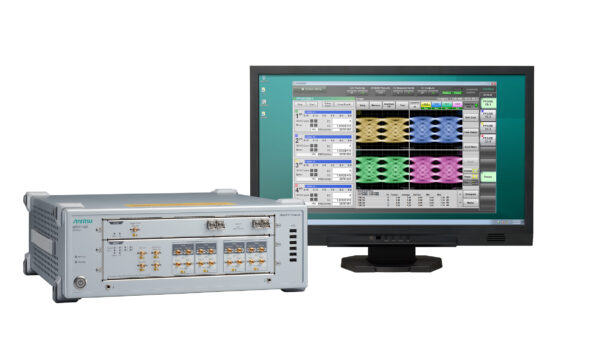Vienna, Austria, July 21, 2021 –Anritsu Corporation is pleased to announce the release of its Signal Processing Software Option-098 adding upgraded functions for evaluating PAM4*1 differential electrical signals to the BERTWave Sampling Oscilloscope MP2110A.
This new option supports standards-compliant measurement of IEEE 802.3 optical-module*2 electrical interfaces, speeding up communications in data centers and mobile networks by upgrading evaluation efficiency for 50 to 400G optical modules using PAM4 technology.
Development Background
Data centers are currently switching to PAM4 optical modules to cope with the large increase in communications traffic on mobile networks. Additionally, in line with the need for easier configuration of flexible networks, PAM4 optical modules for communications support many more communications speeds, ranging from 50 to 800 Gbit/s, than the conventional NRZ*3 technology.
Optical modules support long-distance communication by converting electrical signals from network equipment into optical signals. With conventional optical modules using NRZ technology, showing that optical interfaces could connect equipment from multiple vendors was regarded as important, while similar proof of the interconnectivity of electrical interfaces was seen as unnecessary.
However, with PAM4 optical modules supporting different speeds, the various module types must also be supported at the equipment side. Furthermore, under the conventional system, network equipment and optical modules were procured from the same vendor, but the drive to cut costs is seeing users source equipment and modules from different vendors.
In these circumstances, interconnectivity must be assured, not only between interfaces at the optical side but also at the electrical side. Assuring this interconnectivity requires strict evaluation based on the IEEE 802.3 PHY-layer standards.
To meet these upgraded interconnectivity requirements, while continuing to support PAM4 optical interface measurements, Anritsu has now added support for measurement of IEEE 802.3 PAM4 electrical interfaces to its popular MP2110A, used by many makers as a sampling oscilloscope for manufacturing optical modules.
Product Outline
The BERTWave MP2110A is an all-in-one instrument combining a sampling oscilloscope for evaluating communication-signal waveforms and a BERT for measuring bit error rates. Various upgrade options are available for customizing the number of sampling-oscilloscope channels, etc., to configure a cost-effective test environment matching requirements. Fast, all-at-once and parallel measurement of four channels assures high production-line throughput.
This newly released Option-098 adds new support for measurement of PAM4 electrical interfaces to the current support for the various IEEE 802.3 PAM4 optical modules now on the market. Measurement using the IEEE 802.3 digital filter and equalizer is also supported. Moreover, the new Embedding/De-embedding function*4 facilitates calibration of the measurement environment, including cables, etc. Installing the built-in Clock Recovery Option-054 permits configuration of a trigger-signal-free measurement environment.
BERTWave™ MP2110A Features
- Simultaneous built-in single/dual/quad-channel sampling oscilloscope and BERT
- Sampling oscilloscope with world-beating sensitivity for analysis of optical signals from 26-Gbaud NRZ to 53-Gbaud PAM4 plus optional built-in clock recovery unit
- Fast and stable measurement using built-in PC
Click for more details of MP2110A
Technical Terms
*1 PAM4
Abbreviation for Pulse Amplitude Modulation technology for increasing transmission capacity using amplitude modulation; PAM4 transfers 2 bits of information at four levels in one timeslot.
*2 Optical Module
Hot-pluggable optical transceivers supporting interconnections between electrical and optical signals used for high-speed data communications; connections between equipment use electrical signals and optical-fiber-cable connections use optical signals for data transmission.
*3 NRZ
Abbreviation for Non-Return to Zero digital signal transmission technology.
*4 Embedding/De-embedding Function
The Embedding function is used to observe the signal-attenuation condition when adding cables and PC boards. Conversely, the De-embedding function uses software signal processing to calibrate the unattenuated signal condition to observe the signal immediately after the DUT by simulation.
Image caption:
Standards-Compliant Measurement of PAM4 Signals at Electrical I/F of 50 to 400G Optical Modules















